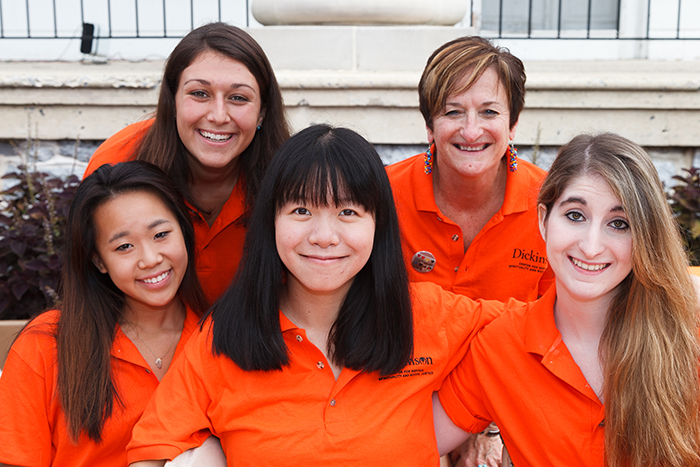Sealed With a CSSS

CSSS representatives spread the word during Orientation. According to CSSS Director Donna Hughes (top right), the center’s logo is orange because it is a warm, inviting color that inspires optimism and open communication. Photo by Carl Socolow '77.
New name, new focus: CSSS outlines three paths to purposeful living
by MaryAlice Bitts-Jackson
The Office of Religious Life is no more. In its place, we have the Center for Service, Spirituality & Social Justice, or CSSS (pronounced “kiss”), giving name to three often intertwining paths to purposeful living.
All of the Office of Religious Life educational programs and events remain—including service trips and community-service opportunities, interfaith-themed dinners, lectures and gatherings—and the office is still a resource to students as they explore their belief systems, learn about others’ beliefs and seek new ways to approach life’s big questions and quests. The difference, says the center’s director, Donna Hughes, is that now, campus community members of all faith traditions—including those with no faith tradition—are explicitly invited to explore ways to engage in service and social justice issues together while learning about belief systems and/or expressing those beliefs.
Hughes had been considering revamping the campus hub of service and religious life since her arrival on campus a few years ago. "The [previous] name just didn’t accurately reflect all that we do, and the words 'religious life' were a little off-putting to some folks,” she says. “So I had a lot of conversations with [the office’s interns and student-workers] about a name that would be more inviting and that would accurately reflect the kind of broad issues we examine.”
History major Sydney Cross ’17 of Lexington, Va., was among those who helped with the name change. A volunteer veteran who has served through her church since elementary school and has completed two internships at nonprofits, she notes that the center's new focus represents a natural evolution, since service is an integral part of many faith traditions, and one cannot volunteer at the Salvation Army, for example, without engaging in social-justice issues. Cross is thrilled that the name change opens up service opportunities to more students with similar value systems but different beliefs.
“Social justice drives my spirituality and service, and volunteering and social justice work have had a huge impact on my life,” says Cross, noting that Dickinson’s emphasis on civic engagement was “a big part” of her decision to attend. “I feel others should have the same access to opportunity.”
To raise awareness, Hughes and her student-workers are hosting a variety of events this fall to celebrate the center's opening, and initial responses have been overwhelmingly positive. “Several times, when I announced the name change to a group of students, they applauded,” Hughes says.
Video by Joe O'Neill
The position of director of service, spirituality & social justice is supported by the United Methodist Church.
Learn more
- Center for Service, Spirituality & Social Justice
- Civic Engagement at Dickinson
- Service Trips
- "Dialogue, Discovery & Religious Life"
- Latest News
Published September 8, 2015